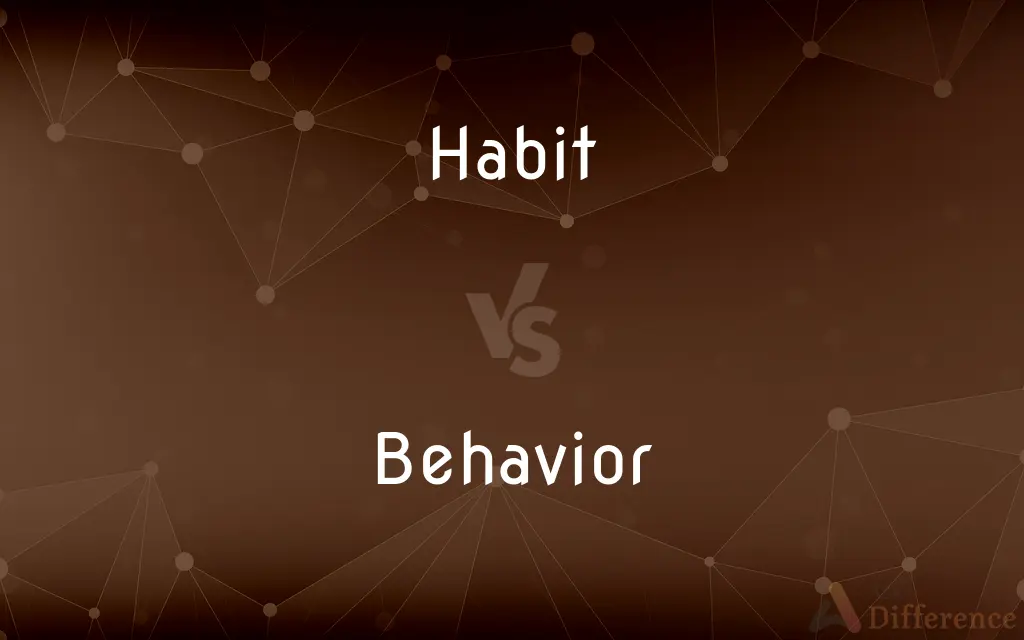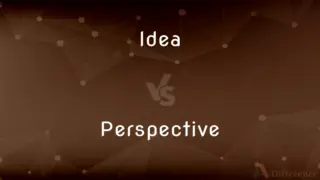Habit vs. Behavior — What's the Difference?
By Tayyaba Rehman & Fiza Rafique — Published on September 8, 2023
Habit refers to a regular practice or tendency, while Behavior encompasses the range of actions and mannerisms exhibited by individuals.

Difference Between Habit and Behavior
Table of Contents
ADVERTISEMENT
Key Differences
Habit generally denotes a repeated act or routine that an individual performs often, to the point where it becomes almost involuntary. Behavior, on the other hand, covers a broader spectrum, referring to the observable actions, reactions, or conduct of a person in response to external or internal stimuli.
A Habit can be seen as a subset of Behavior, a specific action or routine that is practiced frequently. For instance, brushing one's teeth every morning is a Habit, a consistent action done repeatedly. Behavior, in this context, would encompass all the actions one might perform in the morning routine, including brushing, showering, and eating breakfast.
Not all Behavior becomes Habit, but all Habits are forms of Behavior. For an action to transition from a mere Behavior to a Habit, it generally requires repetition and consistency. A person might try a new food (Behavior), but only after eating it regularly might it become a part of their diet (Habit).
Lastly, it's worth noting that while Habits are often associated with individuals, Behavior can be studied and analyzed both at individual and group levels. A Habit might refer to one's practice of reading before bed, while Behavior could examine how different age groups approach leisure reading.
Comparison Chart
Definition
A regular practice or tendency.
The range of actions exhibited by individuals.
ADVERTISEMENT
Scope
Specific, repeated action.
Broad, encompasses all actions and reactions.
Regularity
Often done frequently to the point of being involuntary.
Can be sporadic or consistent.
Individual vs. Group
Usually associated with individuals.
Can be analyzed at individual or group levels.
Involvement
Can become automatic or unconscious.
Often conscious and deliberate, but can be reflexive.
Compare with Definitions
Habit
Habit is a routine of behavior repeated regularly.
His morning Habit includes a jog around the park.
Behavior
Behavior is the manner in which one conducts oneself.
Her Behavior at the party was commendable.
Habit
Habit can be an addiction, especially to drugs or alcohol.
He's trying to kick his smoking Habit.
Behavior
In computing, Behavior can refer to the response of a device or software to inputs.
The software's Behavior can be customized by the user.
Habit
Habit denotes a dominant or regular disposition or tendency.
She has a Habit of biting her nails when nervous.
Behavior
Behavior encompasses the actions or reactions of an individual in response to stimuli.
The cat's Behavior changes when it hears a can opener.
Habit
In clothing, Habit refers to a distinctive set of garments.
The nuns wore their traditional Habit.
Behavior
Behavior can be a treatment or conduct towards others.
His rude Behavior towards guests was unacceptable.
Habit
In natural history, Habit refers to the characteristic mode of growth or occurrence.
This plant has a sprawling Habit.
Behavior
Behavior can also signify the way in which something functions or operates.
The car's Behavior on snowy roads is reliable.
Habit
A habit (or wont as a humorous and formal term) is a routine of behavior that is repeated regularly and tends to occur subconsciously.The American Journal of Psychology (1903) defined a "habit, from the standpoint of psychology, [as] a more or less fixed way of thinking, willing, or feeling acquired through previous repetition of a mental experience." Habitual behavior often goes unnoticed in persons exhibiting it, because a person does not need to engage in self-analysis when undertaking routine tasks. Habits are sometimes compulsory.
Behavior
Behavior (American English) or behaviour (British English; see spelling differences) is the actions and mannerisms made by individuals, organisms, systems or artificial entities in conjunction with themselves or their environment, which includes the other systems or organisms around as well as the (inanimate) physical environment. It is the computed response of the system or organism to various stimuli or inputs, whether internal or external, conscious or subconscious, overt or covert, and voluntary or involuntary.Taking a behavior informatics perspective, a behavior consists of actor, operation, interactions, and their properties.
Habit
A settled or regular tendency or practice, especially one that is hard to give up
He has an annoying habit of interrupting me
We stayed together out of habit
Good eating habits
Behavior
The manner in which one acts or behaves.
Habit
A long, loose garment worn by a member of a religious order
Nuns in long brown habits, black veils, and sandals
Behavior
The actions or reactions of a person or animal in response to external or internal stimuli.
Habit
A person's health or constitution
A victim to a consumptive habit
Behavior
The manner in which something functions or operates
The faulty behavior of a computer program.
The behavior of dying stars.
Habit
Be dressed or clothed
A boy habited as a serving lad
Behavior
(uncountable) Human conduct relative to social norms.
Habit
A recurrent, often unconscious pattern of behavior that is acquired through frequent repetition
Made a habit of going to bed early.
Behavior
(uncountable) The way a living creature behaves or acts generally.
Habit
An established disposition of the mind or character
A pessimistic habit.
Behavior
A state of probation about one's conduct.
He was on his best behavior when her family visited.
Habit
Customary manner or practice
An early riser by habit.
Behavior
(countable) An instance of the way a living creature behaves.
Habit
An addiction, especially to a narcotic drug.
Behavior
Observable response produced by an organism.
Habit
Characteristic appearance, form, or manner of growth, especially of a plant or crystal
"The habit of an apple tree is fine for the small garden" (Robert Dash).
Behavior
(uncountable) The way a device or system operates.
Habit
A distinctive set of clothing or style of dressing, especially of a religious order.
Behavior
Manner of behaving, whether good or bad; mode of conducting one's self; conduct; deportment; carriage; - used also of inanimate objects; as, the behavior of a ship in a storm; the behavior of the magnetic needle.
A gentleman that is very singular in his behavior.
Habit
A riding habit.
Behavior
Manner of acting or conducting yourself
Habit
(Archaic) Physical constitution.
Behavior
The action or reaction of something (as a machine or substance) under specified circumstances;
The behavior of small particles can be studied in experiments
Habit
To clothe; dress.
Behavior
(behavioral attributes) the way a person behaves toward other people
Habit
To clothe in a habit, especially a nun's habit.
Behavior
(psychology) the aggregate of the responses or reactions or movements made by an organism in any situation
Habit
An action performed on a regular basis.
It’s become a habit of mine to have a cup of coffee after dinner.
Habit
An action performed repeatedly and automatically, usually without awareness.
By force of habit, he dressed for work even though it was holiday.
Habit
A long piece of clothing worn by monks and nuns.
It’s interesting how Catholic and Buddhist monks both wear habits.
Habit
A piece of clothing worn for a specific activity; a uniform.
The new riding habits of the team looked smashing!
Habit
(archaic) Outward appearance; attire; dress.
Habit
Form of growth or general appearance and structure of a variety or species of plant or crystal.
Habit
An addiction.
He has a 10-cigar habit.
Kick the habit
Habit
(transitive) To clothe.
Habit
To inhabit.
Habit
The usual condition or state of a person or thing, either natural or acquired, regarded as something had, possessed, and firmly retained; as, a religious habit; his habit is morose; elms have a spreading habit; esp., physical temperament or constitution; as, a full habit of body.
Habit
The general appearance and manner of life of a living organism.
Habit
Fixed or established custom; ordinary course of conduct; practice; usage; hence, prominently, the involuntary tendency or aptitude to perform certain actions which is acquired by their frequent repetition; as, habit is second nature; also, peculiar ways of acting; characteristic forms of behavior.
A man of very shy, retired habits.
Habit
Outward appearance; attire; dress; hence, a garment; esp., a closely fitting garment or dress worn by ladies; as, a riding habit.
Costly thy habit as thy purse can buy.
There are, among the statues, several of Venus, in different habits.
Habit
The distinctive clothing worn commonly by nuns or monks; as, in the late 1900's many orders of nuns discarded their habits and began to dress as ordinary lay women.
How use doth breed a habit in a man!
He who reigns . . . upheld by old repute,Consent, or custom
Habit
To inhabit.
In thilke places as they [birds] habiten.
Habit
To dress; to clothe; to array.
They habited themselves like those rural deities.
Habit
To accustom; to habituate.
Habit
An established custom;
It was their habit to dine at 7 every evening
Habit
A pattern of behavior acquired through frequent repetition;
She had a habit twirling the ends of her hair
Long use had hardened him to it
Habit
(religion) a distinctive attire (as the costume of a religious order)
Habit
Excessive use of drugs
Habit
Put a habit on
Common Curiosities
Is a Habit always a Behavior?
Yes, a Habit is a form of Behavior, but not all Behavior is Habitual.
Is Behavior always conscious?
No, Behavior can be both conscious (deliberate) and unconscious (reflexive).
How can one change a Habit?
Changing a Habit usually requires awareness, intention, and consistent effort.
How are Habits formed in the brain?
Habits are formed through repetition, creating neural pathways that strengthen with each recurrence.
Are all Habits bad?
No, Habits can be both positive (like regular exercise) and negative (like smoking).
Can animals have Habits?
Yes, animals can develop Habitual actions or routines.
What factors influence Behavior?
Behavior can be influenced by internal factors (like genes) and external factors (like environment).
Can Behavior be inherited?
Some Behaviors have genetic components, but environment and learning also play crucial roles.
Are daily routines considered Habits?
Yes, if they are actions repeated consistently, they are Habits.
Can Behaviors evolve into Habits?
Yes, with repetition and consistency, Behaviors can become Habits.
Why study Behavior in psychology?
Understanding Behavior helps in predicting, interpreting, and potentially modifying actions.
Are Habits permanent?
No, with conscious effort and strategies, Habits can be changed or replaced.
Is every repeated Behavior a Habit?
Not necessarily. For Behavior to be considered a Habit, it often becomes somewhat automatic or done without much conscious thought.
Is group Behavior the sum of individual Behaviors?
Not necessarily. Group Behavior can emerge from interactions and might differ from individual tendencies.
Why might Behavior vary in different contexts?
Behavior can change based on stimuli, environment, internal states, and learned responses.
Share Your Discovery

Previous Comparison
Creditor vs. Debtor
Next Comparison
Idea vs. PerspectiveAuthor Spotlight
Written by
Tayyaba RehmanTayyaba Rehman is a distinguished writer, currently serving as a primary contributor to askdifference.com. As a researcher in semantics and etymology, Tayyaba's passion for the complexity of languages and their distinctions has found a perfect home on the platform. Tayyaba delves into the intricacies of language, distinguishing between commonly confused words and phrases, thereby providing clarity for readers worldwide.
Co-written by
Fiza RafiqueFiza Rafique is a skilled content writer at AskDifference.com, where she meticulously refines and enhances written pieces. Drawing from her vast editorial expertise, Fiza ensures clarity, accuracy, and precision in every article. Passionate about language, she continually seeks to elevate the quality of content for readers worldwide.















































